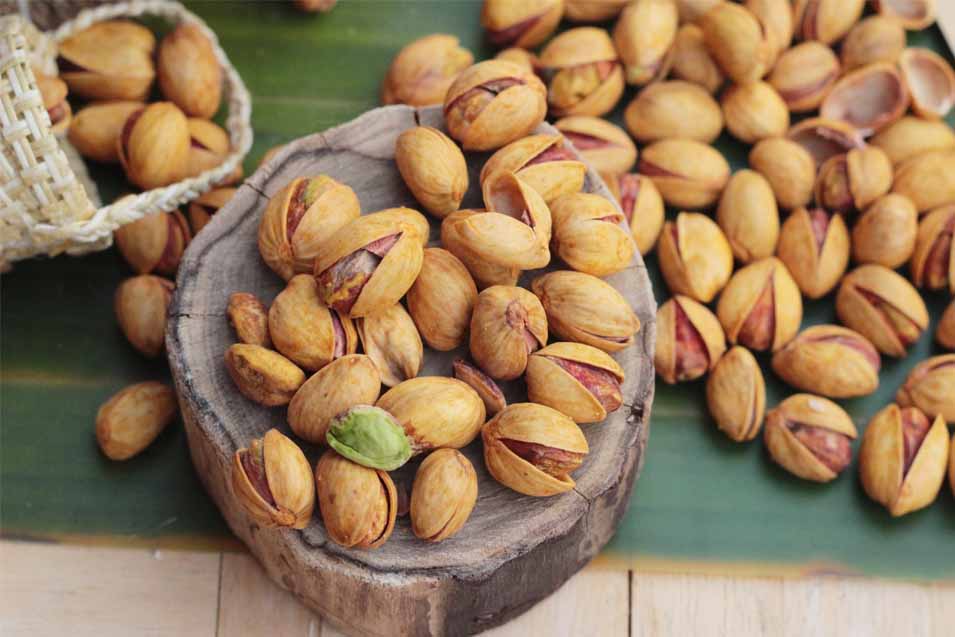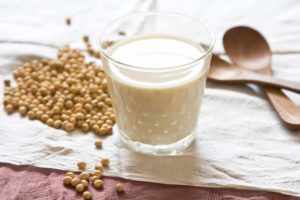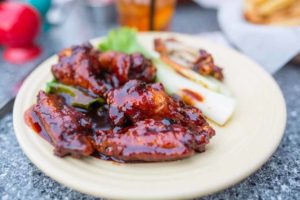Lots of articles and web sites warn dog lovers that they shouldn’t give their dogs nuts – full stop. But the truth is that some nuts are harmful to dogs and some are safe, with certain precautions. Have you thought about giving your dog pistachios? Have you wondered whether dogs can eat pistachios? We’ve got the answer for you.
Nuts and dogs
Some nuts are okay for dogs to eat but there are a few things you should always watch for before you give your dog any nuts:
- Don’t give your dog nuts that are still in their shells. Even if the actual nut is safe for your dog, shells can be tough to digest, cause a blockage, or even tear your dog’s digestive tract. So remove the nut from the shell before giving it to your dog.
- Look for nuts that aren’t packaged with a lot of salt or other chemicals. These ingredients can be bad for your dog.
- Never give your dog nuts that are chocolate-covered or candy-coated. Chocolate is a toxin for dogs because it contains a substance called theobromine, along with caffeine. It can cause your dog’s heart to race and stimulate his nervous system. Candy coatings are full of sugar which is also bad for your dog and can make him hype.
Can dogs eat pistachios?
Pistachios are not toxic to dogs. They are high in fat so you shouldn’t give them to your dog in large amounts. Too much fat all at one time or over a long period of time can lead to pancreatitis. And, as with other nuts, you should remove them from their shells before you give them to your dog.
Facts about pistachios
In terms of nutrition, pistachios are made up of 67 percent fat, 13 percent protein, and 20 percent carbohydrates. They contain significant amounts of vitamin B6, copper, and manganese. They are high in calories. Only 30 pistachios make up 100 calories. Pistachios do have slightly less fat than most other nuts.
Pistachios are great for humans but the high fat content is not so good for your dog. So you can give a few to your dog, with the shell removed, but go easy.
The pistachio seed/kernal is about an inch long and ½ inch in diameter.
Are there any risks associated with pistachios?
Allergic reactions are possible. Pistachios are a member of the same botanical family as cashews, mangos, poison ivy, and sumac. They contain an irritant called urushiol which can cause allergic reactions. Pistachios are pre-cooked to some extent before they are sold to lessen this problem but if you or your dog are super-sensitive to urushiol, there could be a reaction.
Mold contamination is also a possibility, as it is with some other tree seeds. This can lead to the production of aflatoxins which can lead to acute illnesses. This is why there are sometimes recalls involving pistachios.
While mold contamination is a possibility when you purchase pistachios, if you are safely eating the pistachios yourself, they are unlikely to contain mold that would harm your dog. If you drop a few pistachios in the floor while you’re eating them and your dog eats them before you can stop him, it’s unlikely that he’s going to succumb to mold poisoning, as suggested on another site.
Is “pistachio poisoning” real?
No. We did an extensive online search and only found it mentioned on a couple of web sites. Even on those sites the authors admit that pistachios are not toxic to dogs. Your dog is no more likely to be poisoned by pistachios than any other fatty food. Anytime you let your dog eat fatty foods without some precautions there is a risk of digestive upset.
If you give your dog LOTS of pistachios; give him nuts in shells; or feed him pistachios that are covered with lots of salt, yes, your dog could get sick. If you use some common sense, you won’t do these things. Your dog is not going to be “poisoned” from eating a couple of unsalted pistachios that have been removed from their shells.
What about other nuts?
Almonds: not toxic. But they are high in fat so your dog should probably avoid them, especially in large amounts.
Cashews: not toxic but again, these nuts are high in fat so you should not let your dog have more than a couple of them. Like pistachios, they contain urushiol so people (or dogs) that are super sensitive could have a reaction.
Macadamia nuts: NO. You cannot/should not give your dog macadamia nuts. These nuts really are very toxic to dogs, even in small amounts. The exact reason why they are toxic is not known at this time. Unless you live in Hawaii, Australia, or certain areas of South America or Africa, your dog probably won’t accidentally eat macadamia nuts outside, but you should take care that he doesn’t find them in your home. Even a few of these nuts can lead to serious short-term neurological difficulties for your dog such as dizziness, tremors, and temporary paralysis.
Peanuts: not a nut! Peanuts are a legume which makes them a member of the pea family. Raw or roasted, and not in their shells, as long as they are unsalted, your dog can enjoy them. Some dogs can be allergic to peanuts but it’s not a common food allergen. As many dog lovers know, peanut butter is often a big favorite with dogs. If you want to give your dog some peanut butter, be sure to read the label. Some companies are now using the sweetener xylitol in peanut butter, which is harmful to dogs, instead of other sugars. Look for safe peanut butter with no xylitol and a lower sodium content for your dog.
Pecans: not toxic but high in fat. Pecan halves are also large so if you want to give your dog some pecans, buy pecan pieces so your dog won’t choke. But don’t give your dog many of them because of the fat content.
Walnuts: not toxic but like other nuts they are high in fat. Walnut halves can be large for some small dogs to eat, especially considering that many dogs don’t take the time to chew their food. If you want to give your dog a few walnuts, buy small walnut pieces so he won’t choke on them. If you want to be extra careful, you can avoid black walnuts (if you have them growing near you). The juglone associated with these trees doesn’t affect dogs (though it can affect humans and horses), but the husks from fallen nuts can become toxic to dogs and other animals when they start to decay, especially if they come in contact with Penicillium mold. Luckily, most of the walnuts sold in stores today are English walnuts so this isn’t a problem.
In general, there are healthier, safer treats to share with your dog than nuts but if your dog sees you eating some and you can’t resist sharing a couple of nuts, just make sure you never share any macadamia nuts. Those are the one kind of nut that are absolutely toxic to dogs.
The takeaway
Pistachios are not toxic to dogs and they have generous amounts of some vitamins and minerals. However, like other nuts, they are high in fat. You can give some to your dog but it’s best not to give him too many.
With nuts in general, do not let your dog eat the shells. Avoid giving your dog any nuts that are chocolate-covered or candy-coated. And, avoid nuts that are processed with a lot of salt and other chemicals. All of these things can be bad for your dog.
Most nuts are not toxic to dogs but they are very high in fat so you shouldn’t let your dog have very many. The one nut that you should NEVER give your dog is the macadamia nut. Macadamia nuts are TOXIC to dogs.







One Response
It’s a good thing dogs cannot eat pistachios. Because, you know, while I do love my dog, I love my pistachios more.